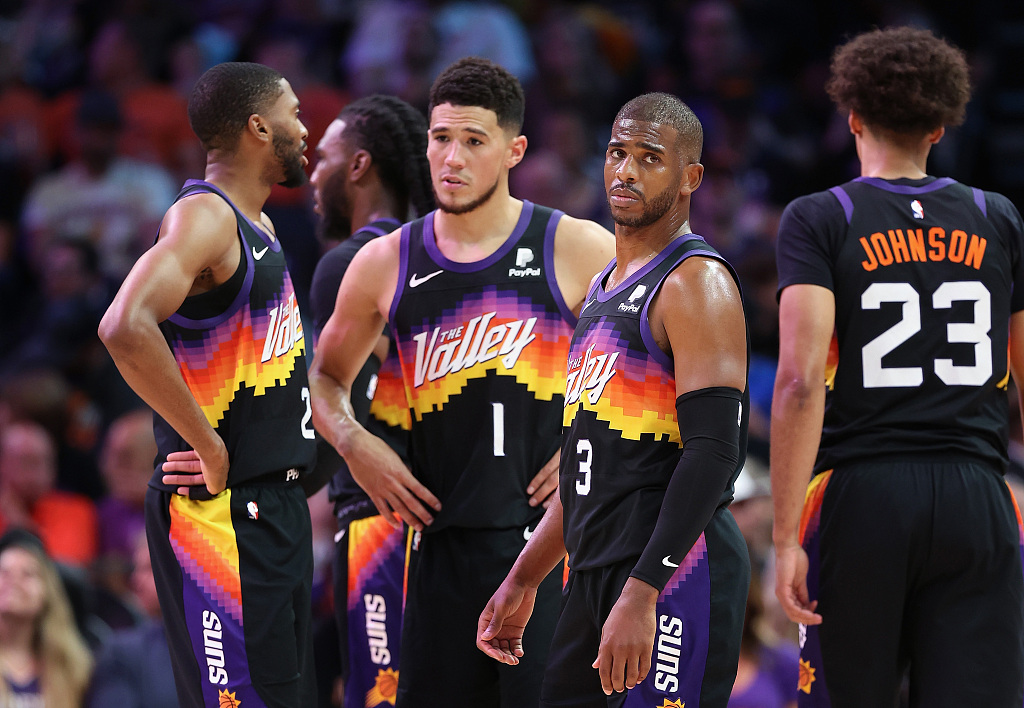
Players of the Phoenix Suns look on in Game 7 of the NBA Western Conference semifinals against the Dallas Mavericks at Footprint Center in Phoenix, Arizona, May 15, 2022. /CFP
Players of the Phoenix Suns look on in Game 7 of the NBA Western Conference semifinals against the Dallas Mavericks at Footprint Center in Phoenix, Arizona, May 15, 2022. /CFP
While the 2022 NBA Finals are still ongoing, the regular season leader Phoenix Suns, which secured a franchise record of 64 wins, has nothing to do with it because the team was knocked out before reaching the Western Conference Finals.
Before the postseason started, many were understandably considering the Suns as one of the biggest candidates for the champion title because they have grown to be an even better team compared with the franchise that lost to the Milwaukee Bucks in six games in the Finals last year.
The crisis began to emerge in the Western Conference first-round playoffs against the New Orleans Pelicans. The Pelicans, even without Zion Williamson, dominated the Suns in rebounds and points in the paint. Jonas Valanciunas kept making shots over the heads of Deandre Ayton, not to mention other smaller defenders in mismatch. He and Larry Nance Jr. didn't face much resistance while combing to grab 52 offensive rebounds in six games.
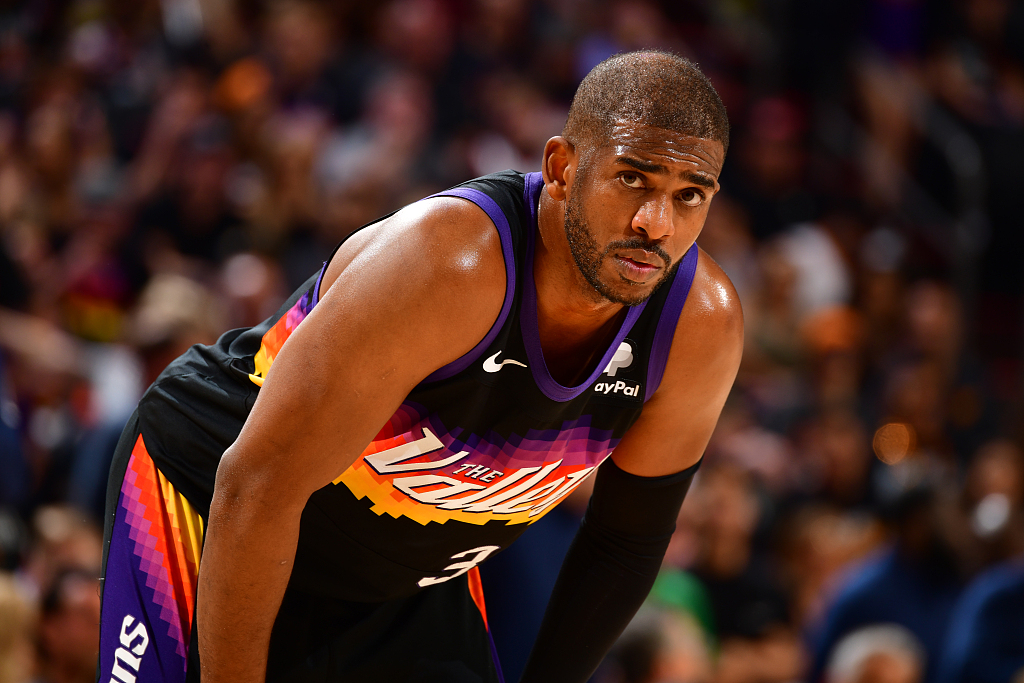
Chris Paul of the Phoenix Suns looks on in Game 7 of the NBA Western Conference semifinals against the Dallas Mavericks at Footprint Center in Phoenix, Arizona, May 15, 2022. /CFP
Chris Paul of the Phoenix Suns looks on in Game 7 of the NBA Western Conference semifinals against the Dallas Mavericks at Footprint Center in Phoenix, Arizona, May 15, 2022. /CFP
That, in fact, was not too surprising because the Suns are at a size disadvantage. Coach Monte Williams kept only one center on the court for the sake of spacing. Ayton, who received much more time than JaVale McGee and Bismack Biyombo may match Valanciunas in size, but tussling under the rim has never been his style of playing.
Meanwhile, the Suns are not big enough in the other four positions. Both Jae Crowder and Mikal Bridges are only 1.98 meters tall. Their size or skills are not built to provide quality help defense either. The "improved defense" of Devin Booker proved not good enough in the playoff-level competitions even in isolation possessions.
Then there came Chris Paul, who has been under heavy criticism since the team's elimination. Despite being 37 years old, he had been seen as a solid defender, even in mismatch, until the West semifinals against the Dallas Mavericks. Luka Doncic, Jalen Brunson and Spencer Dinwiddie all began to attack him during half-court offense, not only to fatigue him, but also because they realized Paul finally became a defensive weak link.
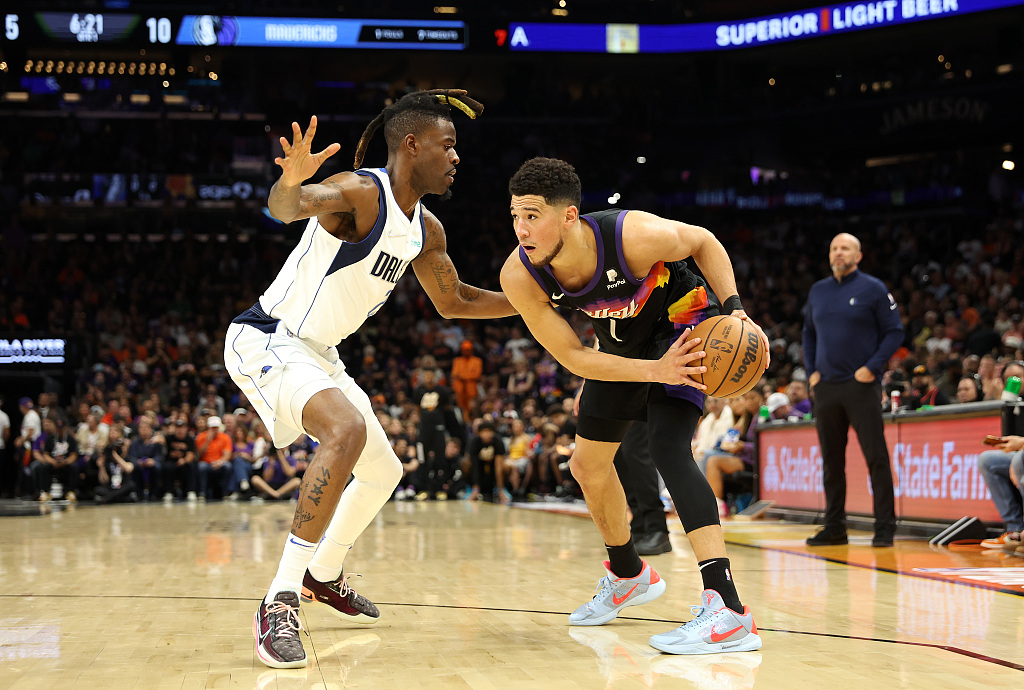
Devin Booker (R) of the Phoenix Suns tries to attack in Game 7 of the NBA Western Conference semifinals against the Dallas Mavericks at Footprint Center in Phoenix, Arizona, May 15, 2022. /CFP
Devin Booker (R) of the Phoenix Suns tries to attack in Game 7 of the NBA Western Conference semifinals against the Dallas Mavericks at Footprint Center in Phoenix, Arizona, May 15, 2022. /CFP
When both Paul and Booker let the opponents break in easily, it further exposed Ayton's problem in making defensive decision facing complicated situations. He is agile enough to follow most perimeter players, but doesn't know when he should return to the paint or the follow off-ball player out. When he, as the last defensive line of the team, makes the wrong calls, the consequences are fatal.
What also went wrong in the postseason was the offense of the Suns. So far no one knows what happened to Paul and caused him to underperform like that after his 37th birthday. Booker's struggling performance facing the Mavericks showed he has not learnt to run offense when he faces intensive trapping. When the back-court pair failed to make plays, the team's offense fell apart completely. Crowder can't be counted on to do more than catch-and-shoot at the 3-point line. Bridges and Ayton are excellent finishers but they are no more than that.
Then is a finisher like Ayton worth a five-year maximum contract extension to the Suns? The team already made their attitude clear then they refused to give him the same deal Doncic, Trae Young or even Michael Porter Jr. got last year. Ayton's offensive advantages are his soft touch despite his size and power. He can score both under the hoop or in the middle range, but he needs to be fed the ball instead of launching isolations like Joel Embiid.
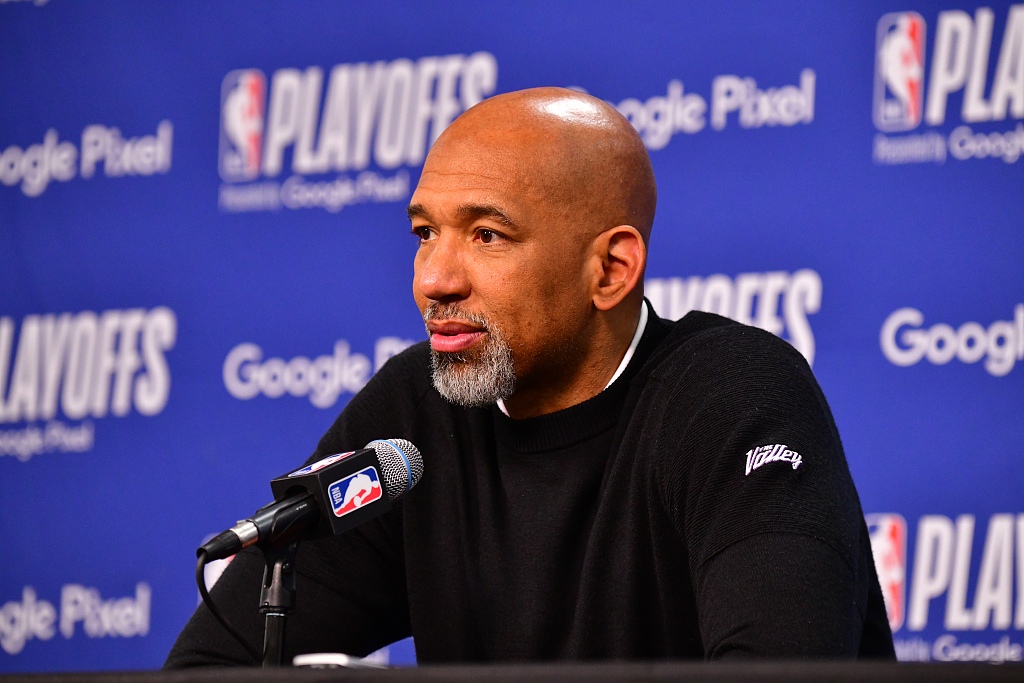
Monty Williams, head coach of the Phoenix Suns, speaks at the post-game press conference after Game 7 of the NBA Western Conference semifinals against the Dallas Mavericks at Footprint Center in Phoenix, Arizona, May 15, 2022. /CFP
Monty Williams, head coach of the Phoenix Suns, speaks at the post-game press conference after Game 7 of the NBA Western Conference semifinals against the Dallas Mavericks at Footprint Center in Phoenix, Arizona, May 15, 2022. /CFP
Despite his defensive problems, Ayton is still a good defender and has the potential to grow better. Big men are born better prepared on the defensive front. Unlike three-time Defensive Player of the Year Rudy Gobert, Ayton won't make the Suns worry about him being punished by perimeter players in mismatch in most occasions. He hasn't reached the top level in any of the categories for a big-man defender, but Ayton has no obvious weakness either.
Nonetheless, the Suns have their calculations as well. They didn't hesitate to keep Bridges with a four-year, $90 million extension last year because an elite 3D player like him costs not even a single dollar than that on the market. Center, on the other hand, are a different story, especially for one who can't shoot 3-pointers and lack isolation skills.
Ayton's skills and character mean he can't be the leader of the team. Neither can the Suns make him a leader because that role belongs to Booker. Since they also need an orchestrator to feed Ayton, it's understandable for the team's front office to assume that a big man like Clint Capela or Jarrett Allen can do most of Ayton's work. Both Capela and Allen make around $20 million a year, but Ayton wants a five-year, $176.9 million extension.
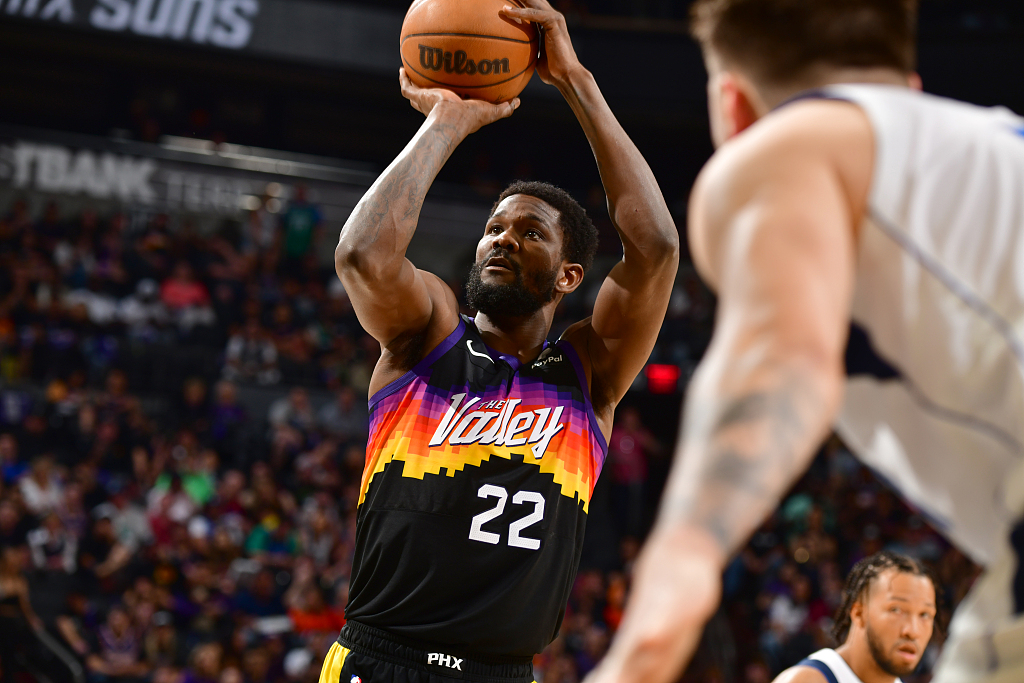
Deandre Ayton (#22) of the Phoenix Suns shoots a free throw in Game 7 of the NBA Western Conference semifinals against the Dallas Mavericks at Footprint Center in Phoenix, Arizona, May 15, 2022. /CFP
Deandre Ayton (#22) of the Phoenix Suns shoots a free throw in Game 7 of the NBA Western Conference semifinals against the Dallas Mavericks at Footprint Center in Phoenix, Arizona, May 15, 2022. /CFP
However, Allen and Capela are likely to be kept on the bench during intensive competitions in the playoffs for their defensive weakness, Ayton won't be. The market doesn't overvalue big men, but a big man like Ayton has the chance to make the difference for the team in one game, simply with his soft touch or the ability to switch to guard perimeter players. The decision to pay expensive salaries and the luxury tax attached for that possibility usually sets the difference between a champion team and a seemingly strong team.

